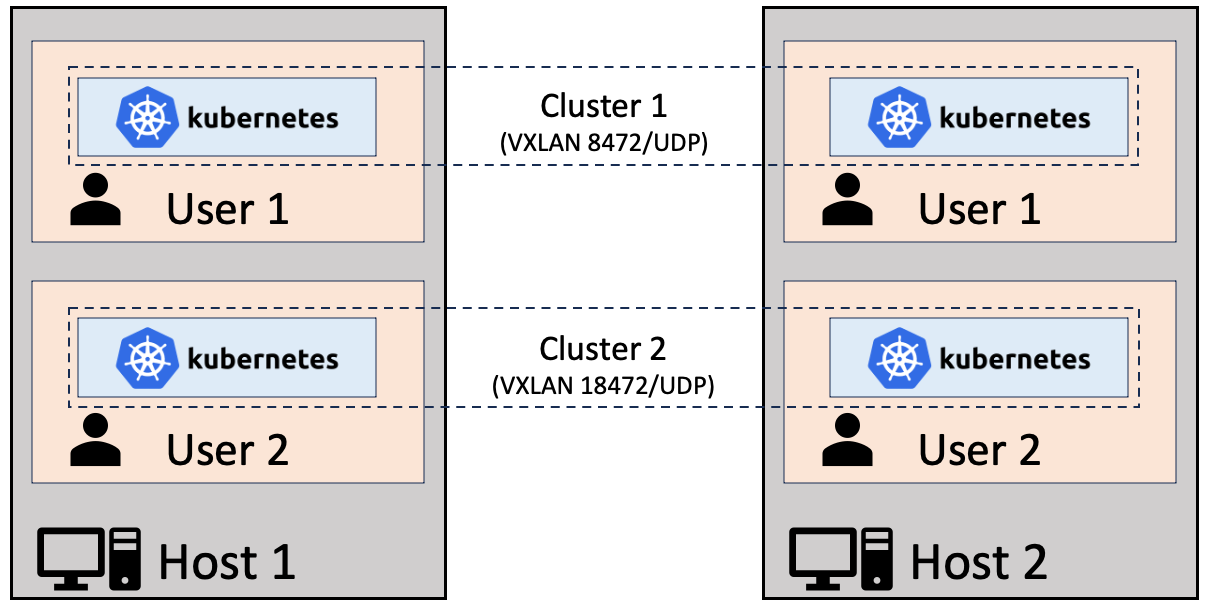Usernetes (Gen2) deploys a Kubernetes cluster inside Rootless Docker, so as to mitigate potential container-breakout vulnerabilities.
Note
Usernetes (Gen2) has significantly diverged from the original Usernetes (Gen1), which did not require Rootless Docker to be installed on hosts.
See the gen1 branch for
the original Usernetes (Gen1).
Usernetes (Gen2) is similar to Rootless kind and Rootless minikube,
but Usernetes (Gen 2) supports creating a cluster with multiple hosts.
- Cluster configuration: kubeadm
- CRI: containerd
- OCI: runc
- CNI: Flannel
- One of the following host operating system:
| Host operating system | Minimum version |
|---|---|
| Ubuntu (recommended) | 22.04 |
| Rocky Linux | 9 |
| AlmaLinux | 9 |
| Fedora | (?) |
- One of the following container engines:
| Container Engine | Minimum version |
|---|---|
| Rootless Docker (recommended) | v20.10 |
| Rootless Podman | v4.x |
| Rootless nerdctl | v1.6 |
curl -o install.sh -fsSL https://get.docker.com
sudo sh install.sh
dockerd-rootless-setuptool.sh install- systemd lingering:
sudo loginctl enable-linger $(whoami)- cgroup v2 delegation:
sudo mkdir -p /etc/systemd/system/[email protected]
sudo tee /etc/systemd/system/[email protected]/delegate.conf <<EOF >/dev/null
[Service]
Delegate=cpu cpuset io memory pids
EOF
sudo systemctl daemon-reload- Kernel modules:
sudo tee /etc/modules-load.d/usernetes.conf <<EOF >/dev/null
br_netfilter
vxlan
EOF
sudo systemctl restart systemd-modules-load.service
- sysctl:
sudo tee /etc/sysctl.d/99-usernetes.conf <<EOF >/dev/null
net.ipv4.conf.default.rp_filter = 2
EOF
sudo sysctl --system
- slirp4netns, not Pasta:
# Podman v5 (or later) users have to change the network mode from pasta to slirp4netns.
# This step is not needed for Docker, nerdctl, and Podman v4.
mkdir -p "$HOME/.config/containers/containers.conf.d"
cat <<EOF >"$HOME/.config/containers/containers.conf.d/slirp4netns.conf"
[network]
default_rootless_network_cmd="slirp4netns"
EOF
Use scripts in ./init-host for automating these steps.
See make help.
# Bootstrap a cluster
make up
make kubeadm-init
make install-flannel
# Enable kubectl
make kubeconfig
export KUBECONFIG=$(pwd)/kubeconfig
kubectl get pods -A
# Multi-host
make join-command
scp join-command another-host:~/usernetes
ssh another-host make -C ~/usernetes up kubeadm-join
make sync-external-ip
# Debug
make logs
make shell
make kubeadm-reset
make down-v
kubectl taint nodes --all node-role.kubernetes.io/control-plane-The container engine defaults to Docker.
To change the container engine, set export CONTAINER_ENGINE=podman or export CONTAINER_ENGINE=nerdctl.
The following environment variables are recognized:
| Name | Type | Default value |
|---|---|---|
CONTAINER_ENGINE |
String | automatically resolved to "docker", "podman", or "nerdctl" |
HOST_IP |
String | automatically resolved to the host's IP address |
NODE_NAME |
String | "u7s-" + the host's hostname |
NODE_SUBNET |
String | "10.100.%d.0/24" (%d is computed from the hash of the hostname) |
PORT_ETCD |
Integer | 2379 |
PORT_KUBELET |
Integer | 10250 |
PORT_FLANNEL |
Integer | 8472 |
PORT_KUBE_APISERVER |
Integer | 6443 |
- Node ports cannot be exposed automatically. Edit
docker-compose.yamlfor exposing additional node ports. - Most of host files are not visible with
hostPathmounts. Editdocker-compose.yamlfor mounting additional files. - Some volume drivers such as
nfsdo not work.
When CONTAINER_ENGINE is set to nerdctl, bypass4netns can be enabled for accelerating connect(2) syscalls.
The acceleration currently does not apply to VXLAN packets.
containerd-rootless-setuptool.sh install-bypass4netnsd
export CONTAINER_ENGINE=nerdctl
make upNote
The support for bypass4netns is still experimental
Multiple users on the hosts may create their own instances of Usernetes, but the port numbers have to be changed to avoid conflicts.
# Default: 2379
export PORT_ETCD=12379
# Default: 10250
export PORT_KUBELET=20250
# Default: 8472
export PORT_FLANNEL=18472
# Default: 6443
export PORT_KUBE_APISERVER=16443
make upAlthough Usernetes (Gen2) is designed to be used with Rootless Docker, it should work with the regular "rootful" Docker too.
This might be useful for some people who are looking for "multi-host" version of kind and minikube.
